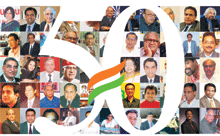 Although its child population is India's most abundant factor endowment — 450 million Indians are below 18 years of age — bafflingly, development of this high-potential resource pool is a low priority of the Central and state governments, and indeed all political parties. Even within the great Indian middle class and Indian industry — which is experiencing unprecedented wage inflation, talent crunch and high training costs — there is insufficient awareness of the vital importance of quality primary, secondary, vocational and tertiary education for all of India’s children and youth. The percentage of GDP expended annually (Centre plus states) for education has never crossed the 4 percent threshold and currently hovers around 3.5 percent against the global average of 5 percent and the 6-7 percent expended in developed countries.
Although its child population is India's most abundant factor endowment — 450 million Indians are below 18 years of age — bafflingly, development of this high-potential resource pool is a low priority of the Central and state governments, and indeed all political parties. Even within the great Indian middle class and Indian industry — which is experiencing unprecedented wage inflation, talent crunch and high training costs — there is insufficient awareness of the vital importance of quality primary, secondary, vocational and tertiary education for all of India’s children and youth. The percentage of GDP expended annually (Centre plus states) for education has never crossed the 4 percent threshold and currently hovers around 3.5 percent against the global average of 5 percent and the 6-7 percent expended in developed countries.
According to EducationWorld estimates, 160 million children countrywide who should be in school, are not. Little wonder that only 9 percent of the 18-24 age group cohort enter institutions of higher education and even of them more than 75 percent of graduates are unemployable, and require intensive training within firms and companies before they become industry-ready.
For nine years EducationWorld has been ploughing a lonely furrow highlighting the grim state of Indian education at the primary, secondary and tertiary levels. In the process we have had to confront a society and entire communities within it, in denial of this on-the-ground reality of massive, unprecedented, wastage of human capital. Nevertheless during the nine years of uninterrupted publishing and relentless focus on the shame, scandals and few triumphs of Indian education, we have acquired domain knowledge and discovered numerous enlightened individuals who have been working largely unsung, towards developing the nation’s abundant human resource.
In this special commemorative Ninth Anniversary issue of EducationWorld we profile 50 influential education leaders and champions who in our opinion are helping to transform and re-define (not invariably for the better) Indian education. Although this list was compiled after careful deliberation and nationwide consultation with eminent social scientists and educationists, it’s illustrative, not exhaustive.
Raja of missed opportunities
.gif) ARJUN SINGH, Union minister of human resources development. A former princeling of the principality of Manda in Madhya Pradesh, this septuagenarian has had a long and chequered career in Indian politics. A die-hard Nehruvian with unwavering loyalty to the Nehru-Gandhi family, which has dominated Indian politics for the past half century, Singh is a former chief minister of Madhya Pradesh (1980-85 and 1988-89) who moved to the Centre in 1985 and rose to the position of Union home minister in the Rajiv Gandhi administration (1984-89).
ARJUN SINGH, Union minister of human resources development. A former princeling of the principality of Manda in Madhya Pradesh, this septuagenarian has had a long and chequered career in Indian politics. A die-hard Nehruvian with unwavering loyalty to the Nehru-Gandhi family, which has dominated Indian politics for the past half century, Singh is a former chief minister of Madhya Pradesh (1980-85 and 1988-89) who moved to the Centre in 1985 and rose to the position of Union home minister in the Rajiv Gandhi administration (1984-89).
Sidelined during the Narasimha Rao, United Front and the NDA interregnum (1991-2004), Singh is believed to have played a major role in the emergence of Sonia Gandhi as leader of the Congress party in the new millennium, and was reportedly disappointed by the allocation of the HRD ministry portfolio in 2004. Yet within this vital socio-economic development ministry, instead of increasing capacity in primary and secondary education, driven by petty politicking and socialist ideology, Singh focused most of his attention on higher education. His dubious achievement has been pushing through an additional 27 percent quota (i.e. in addition to the 22.5 percent reserved quota for Scheduled Castes and Scheduled Tribes) for other backward castes/classes in Central government promoted and aided institutions of higher education including the highly-rated IIMs and IITs. Unmindful of widespread criticism that expansion of non-merit quotas in higher education will dilute academic standards, currently he is doing his best to push faculty reservations down the protesting throats of Indian academia.
Meanwhile despite the unanimous approval of the 86th Amendment of the Constitution (which mandates government to provide free and compulsory education to all children between ages six-14), Singh hasn’t been able to obtain a national consensus on the enabling Right to Education Bill which has been through seven drafts since 2003. Now at the fag end of his term in office, he is likely to be remembered for missed opportunities rather than positive contribution to Indian education •
Checkmated knowledge czar
.gif) SATYEN GANGARAM (‘SAM’) PITRODA, chairman, National Knowledge Commission. Born into an OBC (other backward caste) family of a carpenter, Sam Pitroda is the architect of India’s astonishing telecom revolution of the past two decades which has multiplied the number of telephone connections from 5 million in 1990 to over 250 million currently. Like a large number of middle class youth, he was driven to emigrate to the US in the 1960s with the statutory $8 in his pocket. In the land of opportunity, Pitroda qualified as an electrical engineer and by patenting a large number of electrical switching systems became a self-made dollar millionaire.
SATYEN GANGARAM (‘SAM’) PITRODA, chairman, National Knowledge Commission. Born into an OBC (other backward caste) family of a carpenter, Sam Pitroda is the architect of India’s astonishing telecom revolution of the past two decades which has multiplied the number of telephone connections from 5 million in 1990 to over 250 million currently. Like a large number of middle class youth, he was driven to emigrate to the US in the 1960s with the statutory $8 in his pocket. In the land of opportunity, Pitroda qualified as an electrical engineer and by patenting a large number of electrical switching systems became a self-made dollar millionaire.
In the 1980s he heeded an inner call to return and help the country of his birth, and was appointed chairman of several technology development ‘missions’ (water management, edible oils industry, telecom etc) by prime minister Rajiv Gandhi. Following the assassination of Rajiv Gandhi in 1990, Pitroda inevitably fell foul of the petty politicians of the Janata Dal regime, and returned to the US for over a decade. But in 2004 he responded to the call of Rajiv’s widow Sonia, and reportedly scripted the strategy which routed the ruling BJP in the 2004 general election.
In August 2005, prime minister Manmohan Singh appointed Pitroda chairman of a new, high-powered National Knowledge Commission (NKC) with the brief to transform India into a knowledge society of the 21st century. During its three-year term (which was recently extended to March 2009), NKC has made valuable suggestions for the expansion of capacity in school, collegiate and university education through multiplication of public-private partnerships in education. But repeatedly checkmated by the ideologically obstinate Union HRD minister Arjun Singh and indifferent academia, the impact of Pitroda and NKC on Indian education has been limited. Nevertheless the commission has planted revolutionary seeds of education reform which could still germinate after the general election next summer •
Successful damage controller
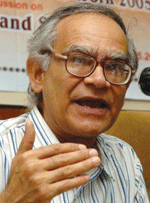 DR. KRISHNA KUMAR, director National Council for Education Research & Training (NCERT), Delhi. A former professor of education at Delhi University and widely acknowledged as an authority on foundational school education, Prof. Krishna Kumar was inducted into NCERT by the Congress-led UPA government immediately after it assumed office in May 2004. His brief was to undo the damage inflicted upon the school education system by the ham-fisted attempts of former Union HRD minister Dr. Murli Manohar Joshi to inject his hindutva agenda into the textbooks of NCERT, the country’s largest school texts publisher.
DR. KRISHNA KUMAR, director National Council for Education Research & Training (NCERT), Delhi. A former professor of education at Delhi University and widely acknowledged as an authority on foundational school education, Prof. Krishna Kumar was inducted into NCERT by the Congress-led UPA government immediately after it assumed office in May 2004. His brief was to undo the damage inflicted upon the school education system by the ham-fisted attempts of former Union HRD minister Dr. Murli Manohar Joshi to inject his hindutva agenda into the textbooks of NCERT, the country’s largest school texts publisher.
Since then Kumar has excised most of the right-wing Hindu propaganda and mythology from NCERT social science textbooks and has played a major role in writing a new National Curriculum Framework for School Education (NCFSE). Published in May 2005, NCFSE recommends secular, liberal and holistic education guidelines for schools and examination boards •
New AICTE incumbent
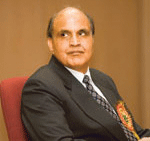 DR. R.A. YADAV, chairman, All India Council for Technical Education (AICTE), Delhi. An alumnus of Punjab University and Delhi School of Economics, Yadav was recently confirmed as chairman of AICTE which supervises, regulates and accredits (through its subsidiary National Board of Accreditation) engineering and technical, business management, pharmacoepial, nursing, hotel management, etc, education in India.
DR. R.A. YADAV, chairman, All India Council for Technical Education (AICTE), Delhi. An alumnus of Punjab University and Delhi School of Economics, Yadav was recently confirmed as chairman of AICTE which supervises, regulates and accredits (through its subsidiary National Board of Accreditation) engineering and technical, business management, pharmacoepial, nursing, hotel management, etc, education in India.
Prior to joining AICTE Yadav was professor of finance and strategic management at the Faculty of Management Studies (FMS), Delhi University, and founder director of Lal Bahadur Shastri Institute of Management, Delhi.
All major engineering, pharmacy colleges and B-schools need to be ‘recognised’ by AICTE (estb.1945) and accredited by NBA, prominent exceptions being the IITs.
Although Yadav has begun his innings at AICTE under a cloud (drawing a pension from Delhi University after being appointed vice- chairman of AICTE in 2005), he is addressing issues of faculty recruitment, outdated curriculums, academic freedom and soft skills training in technical education institutions. Besides attempting to restore faith in AICTE by building a consensus among its stakeholders •
Adult literacy engineers
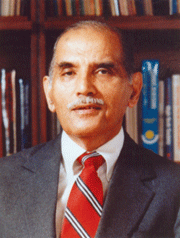 FAKIR CHAND KOHLI, vice chairman emeritus and S. RAMADORAI, managing director of Tata Consultancy Services Ltd. Acclaimed as the father of India’s unexpectedly successful computer software industry, during the three decades ending 2001, Kohli transformed the Mumbai-based TCS (annual revenue: Rs.18,982 crore; no. of employees: 116,000) into India’s largest IT and ITES (information technology enabled services) company. Currently TCS has offices in 50 countries around the world. In 2001, Kohli stepped down as chief executive of the company in favour of Ramadorai, under whose stewardship TCS went public in 2004 and accelerated its scorching pace of growth.
FAKIR CHAND KOHLI, vice chairman emeritus and S. RAMADORAI, managing director of Tata Consultancy Services Ltd. Acclaimed as the father of India’s unexpectedly successful computer software industry, during the three decades ending 2001, Kohli transformed the Mumbai-based TCS (annual revenue: Rs.18,982 crore; no. of employees: 116,000) into India’s largest IT and ITES (information technology enabled services) company. Currently TCS has offices in 50 countries around the world. In 2001, Kohli stepped down as chief executive of the company in favour of Ramadorai, under whose stewardship TCS went public in 2004 and accelerated its scorching pace of growth.
.gif) Almost a decade ago, this duo constituted a high-powered research unit within the company to develop a computer-based functional literacy (CBFL) program to address the national malaise of mass adult literacy — over 350 million adult Indians cannot read or write their own names. In the new millennium, the company presented the nation a revolutionary adult literacy development programme. Based upon visual recognition of familiar words in the mother tongue, this audio-visual learning programme has demonstrated capability to transform comprehensive illiterate adults into literate citizens able to read and understand daily newspapers, after a mere 40 hours of supervised study in informal learning centres (see EW cover story July 2003).
Almost a decade ago, this duo constituted a high-powered research unit within the company to develop a computer-based functional literacy (CBFL) program to address the national malaise of mass adult literacy — over 350 million adult Indians cannot read or write their own names. In the new millennium, the company presented the nation a revolutionary adult literacy development programme. Based upon visual recognition of familiar words in the mother tongue, this audio-visual learning programme has demonstrated capability to transform comprehensive illiterate adults into literate citizens able to read and understand daily newspapers, after a mere 40 hours of supervised study in informal learning centres (see EW cover story July 2003).
Unfortunately and entirely characteristically, the Union and state governments and even Indian industry have exhibited scant interest in this high-potential mass literacy programme. For over three years the customs and excise department refused to allow the import of donated used computers into the country without payment of customs duty. Although this hurdle was removed by former Union minister Arun Shourie in early 2004, the Congress-led UPA government which was unexpectedly voted into office in May 2004 and Union HRD minister Arjun Singh in particular, have completely ignored the high-potential CBFL and particularly to clear the despatch of PCs donated by foreign companies to learning centres across the country. Meanwhile TCS’ CBFL program is limping along unsung despite it having already transformed over 56,000 absolute illiterates into functionally literate citizens •
Primary education watchdog
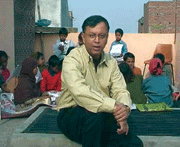 MADHAV CHAVAN, promoter-chief executive of Pratham. A chemistry alumnus of Ohio State University, USA and former reader in physical chemistry at Mumbai University, Chavan experienced a Pauline conversion to the cause of basic education in 1989 and, in 1994 promoted Pratham, an NGO committed to universalising and upgrading elementary education in India. Since then Pratham has emerged as the largest and most influential education NGO countrywide with an annual budget of Rs.75 crore, mainly raised abroad. Operating in 21 states, it has reached over 21 million children through reading and basic maths programmes, initiated with the help of village volunteers and in collaboration with some state governments.
MADHAV CHAVAN, promoter-chief executive of Pratham. A chemistry alumnus of Ohio State University, USA and former reader in physical chemistry at Mumbai University, Chavan experienced a Pauline conversion to the cause of basic education in 1989 and, in 1994 promoted Pratham, an NGO committed to universalising and upgrading elementary education in India. Since then Pratham has emerged as the largest and most influential education NGO countrywide with an annual budget of Rs.75 crore, mainly raised abroad. Operating in 21 states, it has reached over 21 million children through reading and basic maths programmes, initiated with the help of village volunteers and in collaboration with some state governments.
Also active in teacher training, curriculum development and education research, since 2006 Pratham has been publishing its Annual Status of Education Report (ASER), which assesses learning outcomes in government primary schools countrywide (see cover story EW March, 2006). This much acclaimed independent audit of government primaries is conducted with the help of 20,000 ASER volunteers who fan out into 587 of the country’s 630 districts. ASER 2008 reveals that the quality of primary education dispensed in rural India is so poor that over 42 percent of students in class V are unable to exhibit the learning and comprehension capability they should have attained in class II. A fund-raiser extraordinaire, Chavan was also an influential member of the (now defunct) National Advisory Council chaired by Congress party president Sonia Gandhi.
Top-ranked research university chief
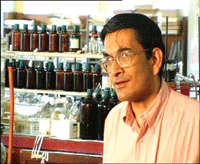 DR. P. BALARAM, director of the Indian Institute of Science (IISc), Bangalore. An alumnus of Poona and Carnegie Mellon universities and IIT-Kanpur, and former chairman of the institute’s hi-tech molecular biophysics unit, Balaram was appointed director of IISc (estb. 1909) in July 2005. Since then IISc’s high ranking as one of the world’s top ranked research universities has been confirmed by the Shanghai Jiao Tong University’s ranking of world universities 2007.
DR. P. BALARAM, director of the Indian Institute of Science (IISc), Bangalore. An alumnus of Poona and Carnegie Mellon universities and IIT-Kanpur, and former chairman of the institute’s hi-tech molecular biophysics unit, Balaram was appointed director of IISc (estb. 1909) in July 2005. Since then IISc’s high ranking as one of the world’s top ranked research universities has been confirmed by the Shanghai Jiao Tong University’s ranking of world universities 2007.
Currently the institute which has commenced its centenary celebrations, houses India’s best sciences research talent including 2,000 research (doctorate) and postgraduate students, a highly qualified faculty of 437 and 52 technical support staff spread over 41 research-intensive departments/ centres and units. The apex science education and research institution in India with an unwritten brief to supervise the development of science education countrywide, IISc receives an annual grant of Rs.120 crore (non-plan and plan expenditure) from the Union government, a sum which is supplemented by income from sponsored research projects. Over the past three years under Balaram’s leadership, IISc has embarked on a major modernisation and expansion drive. New laboratories are being commissioned and new interdisciplinary programmes introduced in science and engineering •
Defanged UGC chief
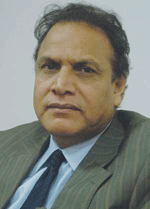 DR. SUKHADEO THORAT, chairman, University Grants Commission (UGC), Delhi. An alumnus of Aurangabad, Marathwada and Jawaharlal Nehru universities, Thorat — a specialist in rural economics, the economics of caste and human rights issues who teaches at JNU’s Centre for the Study of Regional Development — was appointed chairman of UGC in 2006.
DR. SUKHADEO THORAT, chairman, University Grants Commission (UGC), Delhi. An alumnus of Aurangabad, Marathwada and Jawaharlal Nehru universities, Thorat — a specialist in rural economics, the economics of caste and human rights issues who teaches at JNU’s Centre for the Study of Regional Development — was appointed chairman of UGC in 2006.
UGC is the country’s apex level funding and supervisory authority for higher (non-technical) education. With an annual budget of Rs.1,800 crore (2007-08), under the University Grants Commission Act, 1956, the commission has the discretion to provide infrastructure development grants to the country’s 20,677 arts, science, commerce, teacher training, engineering, technology, medical, law, veterinary science colleges affiliated to Central and state universities, with an aggregate enrollment of 11.6 million students. Under the UGC Act, the commission is vested with regulatory powers to enforce minimum standards of teaching, examination and research in non-technical colleges and universities countrywide — a duty which it has practiced more in the breach than observance.
Moreover the National Assessment and Accreditation Council (NAAC) — a subsidiary of UGC — evaluates and grades the infrastructure and academic competence of colleges and universities across the country. Unfortunately NAAC evaluation and accreditation is voluntary, at the option of institutions of higher education •
In search of excellence
.gif) G. VISWANATHAN, chancellor, VIT University, Vellore (Tamil Nadu). An alumnus of Madras University and Madras Law College, Viswanathan threw up a successful career in Tamil Nadu politics to devote himself to the cause of higher technology education. In 1984 he established the Vellore Engineering College under the aegis of the North Arcot Educational and Charitable Trust. In 2001 the steady growth and development of this institution of excellence was rewarded with deemed university status, after which it was renamed the Vellore Institute of Technology University (VIT).
G. VISWANATHAN, chancellor, VIT University, Vellore (Tamil Nadu). An alumnus of Madras University and Madras Law College, Viswanathan threw up a successful career in Tamil Nadu politics to devote himself to the cause of higher technology education. In 1984 he established the Vellore Engineering College under the aegis of the North Arcot Educational and Charitable Trust. In 2001 the steady growth and development of this institution of excellence was rewarded with deemed university status, after which it was renamed the Vellore Institute of Technology University (VIT).
Today VIT, which sprawls over 296 acres in the town of Vellore (pop. 906,745) in Tamil Nadu and bristles with world class infrastructure, has 14,000 students on its rolls (including 1,000 from several Asian and African countries), instructed by a highly-qualified faculty of 800 across six schools of study. Its engineering and technology study programmes are accredited by several well-respected national and international agencies including National Board of Accre-ditation, National Assessment and Accreditation Council, and Institution of Engineering and Technology, UK.
A distinguishing feature of VIT is its outward-looking international orientation. Under Vishwanathan’s leadership VIT has signed 75 memoranda of understanding with offshore education institutions to facilitate faculty and student exchanges, develop academic curriculums and conduct research. Viswanathan’s relentless insistence on global standards of teaching and research has transformed VIT into one of India’s most respected engineering and technology institutions. In a recent national survey of the Delhi-based weekly India Today (May 22, 2008), VIT was ranked among the country’s top 10 engineering colleges preceded by the six top IITs. “My objective is to develop VIT into a globally acknowledged institution of excellence. This won’t be easy but our experience of the past ten years has proved that commitment and hard work makes it possible,” says Viswanathan •
Hesitant education philanthropist
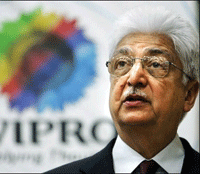 AZIM PREMJI, chairman of Wipro Ltd and the Wipro group of companies. Over three decades ago in the early seventies, Premji had to cut short his higher studies at Stanford University and return to India to take charge of the Mumbai-based Western India Vegetable Oil Products Co, which he diversified into the customised software business in the 1980s. This diversification paid off so mightily that Premji who owns 84 percent equity of this publicly listed Bangalore-based infotech major (sales revenue: Rs.18,087 crore; no. of employees: 95,000), has become the wealthiest individual in India in terms of net worth.
AZIM PREMJI, chairman of Wipro Ltd and the Wipro group of companies. Over three decades ago in the early seventies, Premji had to cut short his higher studies at Stanford University and return to India to take charge of the Mumbai-based Western India Vegetable Oil Products Co, which he diversified into the customised software business in the 1980s. This diversification paid off so mightily that Premji who owns 84 percent equity of this publicly listed Bangalore-based infotech major (sales revenue: Rs.18,087 crore; no. of employees: 95,000), has become the wealthiest individual in India in terms of net worth.
Coterminously, particularly during the past decade, Premji identified the inadequacy and poor quality of primary education as the major impediment to India’s national development effort. To this end he promoted the Azim Premji Foundation (estb. 2000), to which he has endowed a sum variously reported at between Rs.50-65 crore. However the record of APF in upgrading the quality of primary education in India and the state of Karnataka in particular, is sketchy. Mainly involved in teacher training and content development for primary education, thus far APF has not initiated any great institution building or development projects which Premji’s admirers were expecting of him.
However somewhat belatedly Premji has reportedly seen the light and according to media reports has drawn up an ambitious blueprint for establishing a private teacher training and education research university in Karnataka at an estimated project cost of Rs.200 crore •
Public policy driver
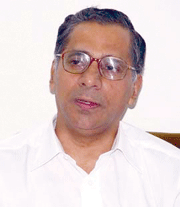 DR. B.B. BHATTACHARYA, vice-chancellor, Jawaharlal Nehru University (JNU), Delhi. An eminent economist and perhaps the country’s foremost authority on econometric modelling and forecasting, Bhattacharya was appointed vice-chancellor of JNU — often referred to as a micro-cosm of Indian society as its campus has students from almost every part of India — in June 2005.
DR. B.B. BHATTACHARYA, vice-chancellor, Jawaharlal Nehru University (JNU), Delhi. An eminent economist and perhaps the country’s foremost authority on econometric modelling and forecasting, Bhattacharya was appointed vice-chancellor of JNU — often referred to as a micro-cosm of Indian society as its campus has students from almost every part of India — in June 2005.
Built to attain the Nehruvian objectives of national integration, social justice, secularism, democratic way of life, international understanding and scientific approach to the problems of society, JNU is a show-piece Central university with several of its schools certified as centres of excellence by UGC. Currently JNU has an enrollment of 5,000 postgrad students in its ten faculties and eight centres of excellence mentored by a faculty of 550 lecturers and professors.
Spread over 1,000 acres in south Delhi, this stronghold of Left-leaning economists and students, which receives an annual grant of Rs.160 crore from the Central government, plays a major role in influencing the economic policies of New Delhi •
Tech education visionary
.gif) DR. M.S. ANANTH, director, Indian Institute of Technology, Madras (IIT-M). An alumnus of AC College of Technology and the University of Florida, Prof. Ananth signed up with the department of chemical engineering of IIT-Madras in 1972, where he steadily rose through the faculty ranks prior to taking charge as director in 2001. Since then under his policy of infrastructure development, technology innovation and project incubation, IIT-Madras has metamorphosed from a low-profile technology school on a sleepy campus into a standard bearer of India’s top six IITs, which have acquired a global reputation for their industry prepared graduates and successful alumni.
DR. M.S. ANANTH, director, Indian Institute of Technology, Madras (IIT-M). An alumnus of AC College of Technology and the University of Florida, Prof. Ananth signed up with the department of chemical engineering of IIT-Madras in 1972, where he steadily rose through the faculty ranks prior to taking charge as director in 2001. Since then under his policy of infrastructure development, technology innovation and project incubation, IIT-Madras has metamorphosed from a low-profile technology school on a sleepy campus into a standard bearer of India’s top six IITs, which have acquired a global reputation for their industry prepared graduates and successful alumni.
Established by the Union government in 1959, the sylvan 633-acre campus of IIT-M houses 15 departments, ten advanced academic research centres and over 100 well-equipped laboratories for teaching and research. The institute offers undergraduate and postgrad engineering and technology study programmes and a five-year integrated postgraduate programme in liberal arts to 5,000 students instructed by a faculty of 460. In its golden jubilee year (2009), IITM is poised for major expansion and is launching several unprecedented academic and research initiatives under a Strategic Vision Plan 2010 master-minded by Ananth.
On the cards is the inauguration of India’s first research park (established at a cost of Rs.300 crore) linked to an academic institute by end 2008; launch of a satellite campus; promotion of a department of medicine; establishment of centres of excellence in telecommunications, nanotechnology, bioprocess technology and sustainable development •
Jamia Millia saviour
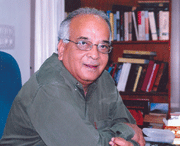 DR. MUSHIRUL HASSAN, vice-chancellor, Jamia Millia Islamia University, Delhi. An eminent historian and the most outspoken voice of the Muslim liberal intelligentsia, Hassan was appointed vice-chancellor of Jamia Millia (estb. 1920 and legislated a Central university by a special Act of Parliament in 1988), in 2004. Acclaim for transforming Jamia Millia into an excellent university of secular learning has made him unpopular with Muslim hardliners and religious fundamentalists. But this alumnus of Aligarh Muslim University with a doctorate from Cambridge University has played a major role in persuading India’s 120-million strong Muslim community to value secular education, and participate in post-independence India’s mainstream politics.
DR. MUSHIRUL HASSAN, vice-chancellor, Jamia Millia Islamia University, Delhi. An eminent historian and the most outspoken voice of the Muslim liberal intelligentsia, Hassan was appointed vice-chancellor of Jamia Millia (estb. 1920 and legislated a Central university by a special Act of Parliament in 1988), in 2004. Acclaim for transforming Jamia Millia into an excellent university of secular learning has made him unpopular with Muslim hardliners and religious fundamentalists. But this alumnus of Aligarh Muslim University with a doctorate from Cambridge University has played a major role in persuading India’s 120-million strong Muslim community to value secular education, and participate in post-independence India’s mainstream politics.
Widely credited for having saved (together with former President Zakir Hussain, diplomat Abid Hussein and educationist Dr. Mohammed Musvee) Jamia Millia from forced closure prior to independence, Hassan who has served this deemed university in various capacities for over four decades, is also credited with having nurtured its mass communication research centre, department for coaching and career planning, academic staff college, academy of third world studies and peace and conflict resolution centre •
Vocational education crusader
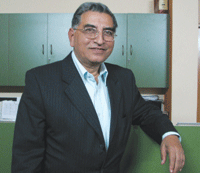 KRISHAN KHANNA, founder chairman iWatch Trust, Mumbai and chairman of i2k Solutions, Mumbai. An indefatigable champion of vocational education for over a decade, in 1993 Khanna threw up a promising corporate career to start iWatch, a not-for-profit charitable trust to promote vocational education for school leavers and dropouts. Indeed this mechanical engineering graduate of IIT-Kharagpur is the unsung hero of Indian education’s belated swing towards vocational learning. In the Union budget 2007-08, an unprecedented Rs.750 crore was provided by finance minister P. Chidambaram for renovating and modernising the country’s 300 (out of 5,445) government-promoted Industrial Training Institutes (ITIs). Moreover in the latest Union budget the finance minister made another handsome provision of Rs.1,500 crore for the establishment of 500 Skill Development Centres countrywide under the public-private partnership model.
KRISHAN KHANNA, founder chairman iWatch Trust, Mumbai and chairman of i2k Solutions, Mumbai. An indefatigable champion of vocational education for over a decade, in 1993 Khanna threw up a promising corporate career to start iWatch, a not-for-profit charitable trust to promote vocational education for school leavers and dropouts. Indeed this mechanical engineering graduate of IIT-Kharagpur is the unsung hero of Indian education’s belated swing towards vocational learning. In the Union budget 2007-08, an unprecedented Rs.750 crore was provided by finance minister P. Chidambaram for renovating and modernising the country’s 300 (out of 5,445) government-promoted Industrial Training Institutes (ITIs). Moreover in the latest Union budget the finance minister made another handsome provision of Rs.1,500 crore for the establishment of 500 Skill Development Centres countrywide under the public-private partnership model.
Knowledgeable monitors of the education scene in India attribute this swing in official perception towards vocational education (currently only 3-4 percent of Indian school leavers opt for vocational stream education cf. 70-75 percent in Germany) to Khanna’s tireless crusade for generous provision of vocational training opportunites as the answer to the country’s huge shortage of skilled technicians, and massive pool of educated unemployed. For 16 years, Khanna has been publishing the iWatch trust’s monthly newsletter Transforming INDIA.
Khanna’s latest passion is electronic teaching and training delivered by the Mumbai-based firm i2k Solutions through the use of artificial intelligence. According to Khanna, i2k Solutions has developed a “100 percent interactive web-based e-learning and e-training platform which can teach any subject to any number of learners on a one-to-one basis” at an unprecedentedly low price of Rs.25 per day •
Education monitor
.gif) DR. PARTH J. SHAH, president of the Centre for Civil Society (CCS), Delhi. An alumnus of Auburn University (USA) and former professor of economics at Michigan University, Shah promoted CCS in 1999. Since then this NGO has transformed into one of the country’s top think-tanks for propagating liberal causes.
DR. PARTH J. SHAH, president of the Centre for Civil Society (CCS), Delhi. An alumnus of Auburn University (USA) and former professor of economics at Michigan University, Shah promoted CCS in 1999. Since then this NGO has transformed into one of the country’s top think-tanks for propagating liberal causes.
In the formulation of public policy related to education, this Delhi-based NGO, which has been sternly critical of poor quality education dispensed in the country’s 1.24 million government schools, has made valuable suggestions for systemic reform. For instance in 2006, CCS persuaded the Delhi state government to abolish an archaic provision which required private school promoters to obtain an ‘essentiality certificate’ from the state government certifying that a new school was needed in the district where it is proposed to be sited.
Moreover under Shah’s leadership CCS has played a major role in shaping the much-delayed Right to Education Bill which in its latest avatar (2008) offers socio-economically disadvantaged citizens considerable freedom in choosing schools for their children and in managing and controlling government primary schools.
Also the author of Law, Liberty and Livelihood (2005), which highlights the harassment of street vendors and citizens working in the informal sector of the economy by policemen and local government officials, Shah has helped CCS emerge as an intelligent and fearless protector of citizens’ economic rights and freedoms •
Design revolutionary
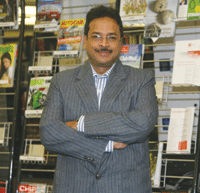 DR. DARLIE O. KOSHY, director of the National Institute of Design (NID), Ahmedabad. An alumnus of Cochin University of Science and Technology and IIT-Delhi, Koshy served a long stint (1987-2000) in the National Institute of Fashion Technology, Delhi, where he was the chair of fashion management studies for over a decade.
DR. DARLIE O. KOSHY, director of the National Institute of Design (NID), Ahmedabad. An alumnus of Cochin University of Science and Technology and IIT-Delhi, Koshy served a long stint (1987-2000) in the National Institute of Fashion Technology, Delhi, where he was the chair of fashion management studies for over a decade.
In acknowledgement of his stellar contribution to the growth and development of NIFT, in the year 2000 Koshy was appointed director of NID (estb. 1961) — India’s top design school comprising five major faculties. Under Dr. Koshy’s leadership NID has promoted two new affiliated institutions — an R&D campus in Bangalore and a postgraduate campus in Gandhinagar (Gujarat). Currently NID offers undergrad and postgrad study programmes to over 1,000 students through a full-time faculty of 70 on the institute’s three campuses. During his tenure NID has been accorded top 25 design schools worldwide ranking by the US-based Business Week (2006 and 2007).
Moreover during Koshy’s tenure the number of NID graduates has risen from a mere 35 in 2000 to over 220 per year currently. According to knowledgeable industry monitors, the fact that the value of India’s exports, particularly of manufactured products (especially automobiles, motorcycles and automotive components), has risen three-fold during the past decade is not unconnected with the nationwide design and innovation revolution sparked by NID under Koshy’s leadership •
Premier boarding school headmaster
.gif) KANTI BAJPAI, headmaster, The Doon School, Dehradun. A former professor of international affairs at Jawaharlal Nehru University and a popular choice of television news channels to comment on foreign policy issues, in his new avatar as the headmaster of perhaps India’s most famous all-boys boarding school, Bajpai has infused his international outlook and academic experience into his alma mater. The blue-chip Doon School (estb.1935), which has an enrollment of 512 students, is widely acknowledged as India’s premier traditional-style boarding school and has been ranked India’s No.1 residential school for two years in a row in the annual EW Survey of Schools (2007 & 2008). Distinguished alumni include former prime minister Rajiv Gandhi, authors Vikram Seth and Amitav Ghosh.
KANTI BAJPAI, headmaster, The Doon School, Dehradun. A former professor of international affairs at Jawaharlal Nehru University and a popular choice of television news channels to comment on foreign policy issues, in his new avatar as the headmaster of perhaps India’s most famous all-boys boarding school, Bajpai has infused his international outlook and academic experience into his alma mater. The blue-chip Doon School (estb.1935), which has an enrollment of 512 students, is widely acknowledged as India’s premier traditional-style boarding school and has been ranked India’s No.1 residential school for two years in a row in the annual EW Survey of Schools (2007 & 2008). Distinguished alumni include former prime minister Rajiv Gandhi, authors Vikram Seth and Amitav Ghosh.
This self-admitted “foreign service brat” who described his appointment as headmaster of Doon in 2003 as “a dream come true”, taught political science at M.S. University, Baroda and Wesleyan University, USA before joining the JNU faculty in 1994.
Responding to the challenge of increasing competition from a new genre of five-star international schools affiliated with foreign exam boards, in 2006 Bajpai signed Doon up with the Geneva-based Interna-tional Baccalaureate Organisation to offer the latter’s IB diploma curriculum as an option to Plus Two students of this venerated 73-year-old boarding school •
Forthright NUEPA chief
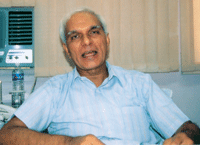 PROF. VED PRAKASH, founder vice-chancellor National University for Educational Planning and Administration (NUEPA), Delhi. A former director of NCERT, World Bank consultant, visiting professor at Windsor University (Canada) and Harvard Institute of International Development and hitherto secretary and chief executive of UGC (University Grants Commission), Prakash was appointed director of the National Institute of Education Planning and Administration (NIEPA) in 2005.
PROF. VED PRAKASH, founder vice-chancellor National University for Educational Planning and Administration (NUEPA), Delhi. A former director of NCERT, World Bank consultant, visiting professor at Windsor University (Canada) and Harvard Institute of International Development and hitherto secretary and chief executive of UGC (University Grants Commission), Prakash was appointed director of the National Institute of Education Planning and Administration (NIEPA) in 2005.
Promoted by Unesco in 1962 as the Asian Regional Centre for Educational Planners and Administration, it was taken over by the Union government in 1970 and renamed the National Staff College for Education Planners and Administration. In 1979 the college was again renamed NIEPA and upgraded into a national university in 2006. Today NUEPA’s role is to provide professional services to the Union government on capacity building in education, policy planning, management research, training and consultancy. In 1995 this institution devised a unique software program christened DISE (District Information System), with which it has been conducting detailed, in-depth surveys of primary education infrastructure, enrollment and related information, in 605 districts countrywide. This massive data gathering exercise is contained in a data-rich and valuable annual report — Elementary Education in India. Published by NUEPA, EEI offers an accurate picture of the condition of primary and upper primary education in India.
Sources within NUEPA attribute the frank and fearless tone of NUEPA’s annual EEI reports to Prakash’s determination to empower NUEPA and make its voice heard and heeded in the councils of government and within the education establishment •
Science voice in wilderness
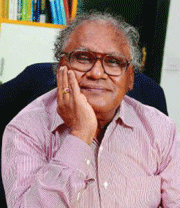 DR. C.N.R RAO, chairman, Scientific Advisory Council to the prime minister and president, Jawaharlal Nehru Centre for Advanced Scientific Research, Bangalore. The country’s most high-profile scientist who seldom misses an opportunity to rail about the neglect of science education and the over-emphasis on skills-based technical education, Rao has warned of the dangers of a growing number of arts, science and commerce colleges closing down their science faculties, and of neglect of research in the IITs which are “being converted into ordinary engineering colleges”. Moreover recently Rao made media headlines by attributing the decline of Bangalore — hitherto a centre of academic and scientific research —into a chaotic city to “people who have a lot of money and no minds because of IT...”
DR. C.N.R RAO, chairman, Scientific Advisory Council to the prime minister and president, Jawaharlal Nehru Centre for Advanced Scientific Research, Bangalore. The country’s most high-profile scientist who seldom misses an opportunity to rail about the neglect of science education and the over-emphasis on skills-based technical education, Rao has warned of the dangers of a growing number of arts, science and commerce colleges closing down their science faculties, and of neglect of research in the IITs which are “being converted into ordinary engineering colleges”. Moreover recently Rao made media headlines by attributing the decline of Bangalore — hitherto a centre of academic and scientific research —into a chaotic city to “people who have a lot of money and no minds because of IT...”
Indian academia and the public would do well to heed Rao’s warnings because he is perhaps India’s most distinguished scientist. An alumnus of Mysore, Benares Hindu and Purdue universities, Rao began his career as professor of chemistry at IIT-Kanpur and rose within academia to the apex position of director of the prestigious Indian Institute of Science, Bangalore (1984-94). This indefatigable septua-genarian is currently visiting professor at Purdue, Oxford and Cambridge universities and widely acknowledged as one of the world’s foremost authorities on solid state and materials chemistry •
Pedagogy change driver
 HARI SANKARAN, managing director, Infrastructure Leasing & Financial Services (IL&FS) Ltd, Mumbai. An alumnus of the London School of Economics with extensive experience in diverse areas of infrastructure development, Sankaran who signed up with IL&FS in 1990, is also the chairman of IL&FS’ Education and Technology Services (IETS).
HARI SANKARAN, managing director, Infrastructure Leasing & Financial Services (IL&FS) Ltd, Mumbai. An alumnus of the London School of Economics with extensive experience in diverse areas of infrastructure development, Sankaran who signed up with IL&FS in 1990, is also the chairman of IL&FS’ Education and Technology Services (IETS).
An education infrastructure development initiative promoted as Schoolnet India in 1998 to change learning pedagogies across the country through innovative and cost-effective IT-enabled solutions for rural and urban India, IETS’ most famous innovation is the K-Yan or ‘community computer’, described by the Delhi-based weekly Outlook as “one of the 10 cutting edge Indian technologies that could transform lives across the world”. Currently K-Yan is being utilised in 1,850 schools countrywide and IETS has trained 368,727 teachers equipping them with IT and ICT skills. Moreover IETS’ e-governance programme has covered more than 211,550 government employees across the country.
Sankaran’s latest initiative under the IETS umbrella is the rolling out of a master plan to establish 100,000 fully-wired Common Service Centres in rural India which will provide a plethora of e-services and contemporise education provision •
Schooling reformer
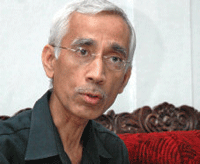 DR. ASHOK GANGULY, hitherto chairman of CBSE (Central Board of Secondary Education). An alumnus of Allahabad University, Ganguly headed the largest pan-India examination board with 9,824 affiliated schools for eight years until he laid down the seals of office recently. During his reign as supremo of CBSE, Ganguly initiated exemplary academic and exam evaluation reforms in secondary education. They include introduction of novel subjects such as defence studies, fashion technology, mass media, genetic engineering and entrepreneurship in secondary schools; and laying the seeds of elimination of the sudden death examinations in favour of continuous grading systems. The pace of reform within this standards-setting board has accelerated during recent years with the rising popularity of competitive international examination boards such as the International Baccalaureate Organisation and Cambridge International Examinations among India’s top-tier schools.
DR. ASHOK GANGULY, hitherto chairman of CBSE (Central Board of Secondary Education). An alumnus of Allahabad University, Ganguly headed the largest pan-India examination board with 9,824 affiliated schools for eight years until he laid down the seals of office recently. During his reign as supremo of CBSE, Ganguly initiated exemplary academic and exam evaluation reforms in secondary education. They include introduction of novel subjects such as defence studies, fashion technology, mass media, genetic engineering and entrepreneurship in secondary schools; and laying the seeds of elimination of the sudden death examinations in favour of continuous grading systems. The pace of reform within this standards-setting board has accelerated during recent years with the rising popularity of competitive international examination boards such as the International Baccalaureate Organisation and Cambridge International Examinations among India’s top-tier schools.
Designated an autonomous body, CBSE is under the direct control of the Union ministry of human resource development and is obliged to prescribe NCERT textbooks for its 9,824 affiliated schools. During the latter years of his term in office, the media-shy Ganguly came under a cloud and was investigated by the Central Vigilance Commissioner for flouting service rules and allegedly promoting textbooks of private publishers. In the end nothing came of these charges, which were dismissed as unfounded. Therefore Ganguly is likely to be remembered as an influential harbinger of overdue changes in India’s largest examination board whose affiliated schools have a combined enrollment of over 4 million students countrywide •
Model government schools leader
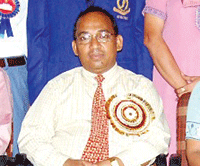 RANGLAL JAMUDA, IAS commissioner, Kendriya Vidyalaya Sangathan (KVS). A graduate of Ravenshaw College, Cuttack (Utkal University) with an MBA from the University of Hull (UK), Jamuda took charge as commissioner of KVS in September 2004 following postings in Orissa in the power sector, and as higher education and revenue secretary of the state government. Initially promoted by the Central government as schools for its employees, KVs have since emerged as model government schools with a reputation for academic excellence. Consequently 23 percent of the 101,698 students in 981 KVs countrywide instructed by a massive teacher task force of 20,000, are children from non-government households.
RANGLAL JAMUDA, IAS commissioner, Kendriya Vidyalaya Sangathan (KVS). A graduate of Ravenshaw College, Cuttack (Utkal University) with an MBA from the University of Hull (UK), Jamuda took charge as commissioner of KVS in September 2004 following postings in Orissa in the power sector, and as higher education and revenue secretary of the state government. Initially promoted by the Central government as schools for its employees, KVs have since emerged as model government schools with a reputation for academic excellence. Consequently 23 percent of the 101,698 students in 981 KVs countrywide instructed by a massive teacher task force of 20,000, are children from non-government households.
Undoubtedly since the first 20 KVs were established in 1962-63, these Central government-funded schools have established a brand reputation on a par with IITs and IIMs. Little wonder the approach paper to the Eleventh Plan (2007-12) has officially called upon state governments to adopt KVs as the model for all government schools countrywide to emulate •
Distinguished education missionary
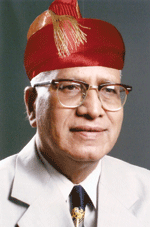 DR. M. S. GOSAVI, secretary, Gokhale Education Society (GES), Nashik. A commerce postgraduate of Poona University and the first individual in the state of Maharashtra to be awarded a doctorate in business administration, Dr. Gosavi’s distinguished academic career began when the late T.A. Kulkarni, the founder of GES (estb.1918), appointed him principal of BYK College of Commerce, Nashik in 1958 at the young age of 22. In 1960 he became a life member of GES and was elected secretary in 1973, a position he has held for 35 years.
DR. M. S. GOSAVI, secretary, Gokhale Education Society (GES), Nashik. A commerce postgraduate of Poona University and the first individual in the state of Maharashtra to be awarded a doctorate in business administration, Dr. Gosavi’s distinguished academic career began when the late T.A. Kulkarni, the founder of GES (estb.1918), appointed him principal of BYK College of Commerce, Nashik in 1958 at the young age of 22. In 1960 he became a life member of GES and was elected secretary in 1973, a position he has held for 35 years.
As secretary of GES (a registered society), the now septuagenarian Gosavi has played a leader’s role in helping the society promote world-class schools, colleges and research centres across Maharashtra, India’s most industrialised state. Currently GES — perhaps the sole education trust countrywide managed and administered by teachers — runs three research centres, 15 undergrad and 13 junior colleges, 20 higher secondary schools, 23 primary and pre-primary schools, ten agricultural training centres, three ashramshalas and seven hostels with an aggregate enrollment of 100,000 students and 3,000 teaching and support staff.
In a career spanning four decades, during which he has held several eminent positions including that of dean of commerce, Pune University (1964-66); president, Indian Commerce Association; and board member, AICTE, Gosavi’s contribution to the evolution of education in Maharashtra, particularly the Nashik region, which has since emerged as an education hub, is widely acknowledged. Among other achievements, he is credited with introducing the first full-time residential MBA degree programme in Maharashtra and the first postgraduate diploma in capital market management in India (1991). A management education guru and author of ten books, Dr. Gosavi continues to lead and counsel the 90 education institutions under the GES umbrella •
Low-profile educator
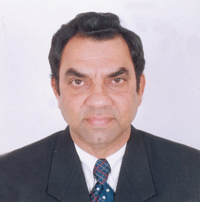 DR. (FR.) HECTOR D’SOUZA, president, Jesuit Conference of India. The provincial (South Asia) of the Society of Jesus, aka Jesuits, Fr. D’Souza is an alumnus of St. Aloysius College, Mangalore with a Ph D in social anthropology from Delhi University. In his capacity as president of the Jesuit Conference, D’Souza supervises the activities of 20 Jesuit provincials in India.
DR. (FR.) HECTOR D’SOUZA, president, Jesuit Conference of India. The provincial (South Asia) of the Society of Jesus, aka Jesuits, Fr. D’Souza is an alumnus of St. Aloysius College, Mangalore with a Ph D in social anthropology from Delhi University. In his capacity as president of the Jesuit Conference, D’Souza supervises the activities of 20 Jesuit provincials in India.
For over 400 years, since they established their first learning institution in India in 1543, Jesuits have rendered invaluable and characteristically low-profile service to Indian education. Currently the Society of Jesus (Jesuits) manages 26 university affiliated colleges; ten B-schools, ten centres of social research, 116 teacher training colleges, six institutes of communication, 50 secondary, 102 high, 100 middle and 102 primary schools with an estimated aggregate enrollment of 350,000 students across the country. Some of India’s most highly-rated colleges including Loyola, Chennai; St. Xavier’s, Mumbai; St. Xavier’s, Calcutta; St. Joseph’s, Bangalore and XLRI Jamshedpur are Jesuit-promoted institutions.
Under D’Souza’s leadership the conference has sent a formal application to the Union government to establish a Xavier Central University which will serve as an umbrella organisation for Jesuit institutions of higher education, and a network of community colleges across India •
Private education champion
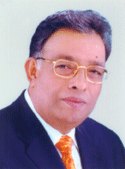 DR. M.R. JAYARAM, chairman, Consortium of Medical, Engineering and Dental Colleges-Karnataka (Comed-K) and Gokula Education Foundation (GEF). A commerce graduate of Bangalore University, Dr. Jayaram is the chairman of the Gokula Education Foundation which manages the M.S. Ramaiah Group of 18 education institutions sited on a sprawling 65-acre campus in suburban Bangalore.
DR. M.R. JAYARAM, chairman, Consortium of Medical, Engineering and Dental Colleges-Karnataka (Comed-K) and Gokula Education Foundation (GEF). A commerce graduate of Bangalore University, Dr. Jayaram is the chairman of the Gokula Education Foundation which manages the M.S. Ramaiah Group of 18 education institutions sited on a sprawling 65-acre campus in suburban Bangalore.
In 2005 he was appointed chairman of Comed-K. Currently Comed-K has a membership of 117 engineering, 14 medical and 26 dental colleges with an aggregate enrollment of 160,000 students in Karnataka. Under Dr. Jayaram’s leadership, the consortium has represented the interests of Karnataka’s unaided professional colleges in the Karnataka high court and Supreme Court to wrest “reasonable” (as defined by the apex court) tuition fee structures as also large management (i.e. full fee) quotas for Comed-K member colleges.
Founded in 1962 by the late M.S. Ramaiah (1922-1997), a successful civil contractor, visionary, educationist, industrialist and philanthropist, GEF has promoted 18 education institutions (including a B-School, medical, dental, and engineering colleges) which provide KG-Ph D level education to over 6,500 students •
World’s largest school promoter
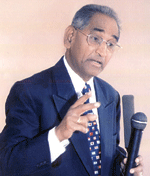 DR. JAGDISH GANDHI, promoter-chairman, City Montessori School, Lucknow. A graduate of Lucknow University, in 1959 Gandhi with his wife Bharti started a one room school in Lucknow with a first batch of five students. That initiative has since morphed into the CISCE-affiliated City Montessori School (CMS), a K-12 conglomerate of private schools with the largest student enrollment in a single city (32,000 students, spread over 20 campuses), an institution building achievement acknowledged by Guinness World Records. In addition to a rain of awards that have been conferred upon Gandhi and CMS, this is also the only school worldwide to be awarded the UNESCO Prize for Peace Education (2002), the citation for which describes CMS as “not a school like any other... it stands out because of its philosophy.”
DR. JAGDISH GANDHI, promoter-chairman, City Montessori School, Lucknow. A graduate of Lucknow University, in 1959 Gandhi with his wife Bharti started a one room school in Lucknow with a first batch of five students. That initiative has since morphed into the CISCE-affiliated City Montessori School (CMS), a K-12 conglomerate of private schools with the largest student enrollment in a single city (32,000 students, spread over 20 campuses), an institution building achievement acknowledged by Guinness World Records. In addition to a rain of awards that have been conferred upon Gandhi and CMS, this is also the only school worldwide to be awarded the UNESCO Prize for Peace Education (2002), the citation for which describes CMS as “not a school like any other... it stands out because of its philosophy.”
Besides posting excellent results in CISCE school-leaving classes X and XII exams year on year, a distinguishing charac-teristic of CMS is its extraordinary emphasis on broad co-curricular education for teachers and students. The school hosts 24 international events on subjects ranging from astronomy to robotics annually and has an active student exchange programme with 20 schools abroad. It is also the first school in Uttar Pradesh — India’s most populous state (180 million) — to have installed an in-house FM radio network and uniquely, has hosted seven international conferences of chief justices from around the world to discuss ways and means to build a safer world for children. In the past 20 years, CMS students have been awarded national and international scholarships valued at over Rs.50 crore.
Although the septuagenarian Dr. Gandhi often draws flak for his aggressive use of the media to promote CMS, there’s no denying this pace setting and exemplar institution he promoted 49 years ago is highly regar-ded and respected. In the EW Survey of Schools 2008, CMS was ranked among the top 60 day schools countrywide, and third in Uttar Pradesh •
Children’s rights crusader
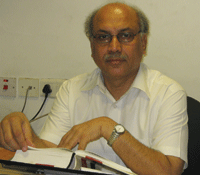 ASHOK AGARWAL, president, Social Jurist Forum, Delhi. An alumnus of Delhi and Agra universities and a professional lawyer, Agarwal founded Social Jurist, a society of activist lawyers and social workers in 1999. Since then Social Jurist has filed more than 100 PIL (public interest litigation) writs mainly in the Delhi high court and Supreme Court on education-related issues to get judicial backing for public education reforms.
ASHOK AGARWAL, president, Social Jurist Forum, Delhi. An alumnus of Delhi and Agra universities and a professional lawyer, Agarwal founded Social Jurist, a society of activist lawyers and social workers in 1999. Since then Social Jurist has filed more than 100 PIL (public interest litigation) writs mainly in the Delhi high court and Supreme Court on education-related issues to get judicial backing for public education reforms.
Moreover, apart from involvement with education, Social Jurist is pushing for judiciary-backed reforms in healthcare, child labour, human and labour rights. Driven by the philosophy of a rights-based approach, Social Jurist’s broader goal is to awaken under-privileged and short-changed commu-nities and make them aware of their legal rights under the Constitution and the law and to help enforce them.
Also a CPM (Communist Party Marxist) activist, Agarwal has succeeded in impacting school education in Delhi for the better. For instance he prompted the courts to ban nursery admission interviews of children and parents. Moreover he persuaded the courts to enforce a 25 percent quota for poor neighbourhood students in private primary-secondary schools granted land at concessional prices by the Delhi municipal and state governments.
Undoubtedly over the past eight years since Social Jurist was promoted by Agarwal, it has forced the educracy in the national capital to become responsive to education related issues. His most recent victories include Supreme Court directives to the Delhi state government to empower child labour courts and to raise teaching-learning standards in municipal schools to those of the Central government’s highly-regarded 981 Kendriya Vidyalaya schools countrywide •
Challenged children’s champion
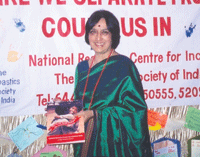 DR. MITHU ALUR, founder-chairperson Spastics Society of India (SSI) and the National Resource Centre for Inclusion (NRCI), Mumbai. An alumnus of the London School of Economics with a Ph D awarded by London University, Alur who founded the Spastics Society in 1972 and the state-of-the-art National Resource Centre for Inclusion, Mumbai in 1999, is the celebrated champion of the disabled, especially children with disabilities.
DR. MITHU ALUR, founder-chairperson Spastics Society of India (SSI) and the National Resource Centre for Inclusion (NRCI), Mumbai. An alumnus of the London School of Economics with a Ph D awarded by London University, Alur who founded the Spastics Society in 1972 and the state-of-the-art National Resource Centre for Inclusion, Mumbai in 1999, is the celebrated champion of the disabled, especially children with disabilities.
Apart from promoting SSI and NRCI which provide education to 2,000 physically and mentally challenged children, under the auspices of these two organisations, Alur has staged two global North-South conferences on inclusive education (i.e on ways and means to include challenged children into mainstream education) in Mumbai (2001) and Kochi (2003).
According to Alur, currently there are 40 million differently abled children in India who are denied education. As a result of her tireless efforts to champion the rights of challenged children, the Union government has accepted their inclusion into mainstream schools as a cardinal principle of its education policy •
Cultural education missionary
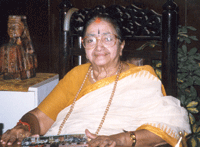 DR. Y.G. PARTHASARATHY, dean and director, PSBB Schools, Chennai. A renowned teacher, administrator and patron of the arts and culture, octogenarian Y.G. Rajalakshmi Parthasarathy (popularly known as Dr. YGP) is a pioneer of progressive and culturally rooted education in Chennai. In 1958, when most middle class children in Chennai clamoured for admission into Christian missionary schools, YGP promoted Bala Bhavan, which focused on Indian culture and values, with an enrollment of 13 students. This modest initiative has since grown to four Padma Seshadri Bala Bhavan (PSBB) schools, affiliated to the Central Board of Secondary Education (CBSE), offering holistic education to 7,300 students instructed by 500 teachers.
DR. Y.G. PARTHASARATHY, dean and director, PSBB Schools, Chennai. A renowned teacher, administrator and patron of the arts and culture, octogenarian Y.G. Rajalakshmi Parthasarathy (popularly known as Dr. YGP) is a pioneer of progressive and culturally rooted education in Chennai. In 1958, when most middle class children in Chennai clamoured for admission into Christian missionary schools, YGP promoted Bala Bhavan, which focused on Indian culture and values, with an enrollment of 13 students. This modest initiative has since grown to four Padma Seshadri Bala Bhavan (PSBB) schools, affiliated to the Central Board of Secondary Education (CBSE), offering holistic education to 7,300 students instructed by 500 teachers.
One of India’s first women journalists, who worked briefly in The Mail and The Hindu before she switched to education, Dr.YGP enrolled for the B.Ed study programme of Mysore University at age 45. This was followed by an M.Ed and a Master’s in history and a doctorate from Madras University. Since then under her enlightened leadership, PSBB schools have attained an excellent reputation for providing high quality academic education enriched by culturally-rooted co-curricular education.
Now celebrating its golden jubilee year, with the launch of a media club for students and a host of celebratory activities, in collaboration with the Delhi-based Educomp Solutions Ltd, Dr. YGP has successfully launched the state-of-the art, fully wired PSBB Millennium School in Chennai (see EW October 2008) •
Pre-school education diva
 LINA ASHAR is the founder-director of Kangaroo Kids Education Limited (KKEL), Mumbai. Educated in Africa, UK and Australia and an education alumna of the Victoria College, Melbourne, Ashar began her career as a secondary school teacher in Australia in 1989. Four years later she relocated to India to promote KKEL.
LINA ASHAR is the founder-director of Kangaroo Kids Education Limited (KKEL), Mumbai. Educated in Africa, UK and Australia and an education alumna of the Victoria College, Melbourne, Ashar began her career as a secondary school teacher in Australia in 1989. Four years later she relocated to India to promote KKEL.
Starting with one pre-school in Bandra, Mumbai with a first batch of 25 children, Ashar has engineered the growth of KKEL across 17 cities in India and Dubai. Today the company provides its services to 45 Kangaroo Kids pre-schools, 45 Kangaroo Kids Toddler Centres and 20 Billabong High International schools run on the franchise model. KKEL has recruited, trained and nurtured a team of over 75 skilled and experienced educationists who design, develop and deliver curricula based on contemporary education research and pedagogies — apart from continuous in-service teacher training to its 110 franchised schools.
Over the past 14 years since she started her first pre-school in Mumbai, Ashar has refined and enriched her education philosophy and pedagogies, which have beneficially impacted the neglected area of pre-school education in particular, raising standards countrywide •